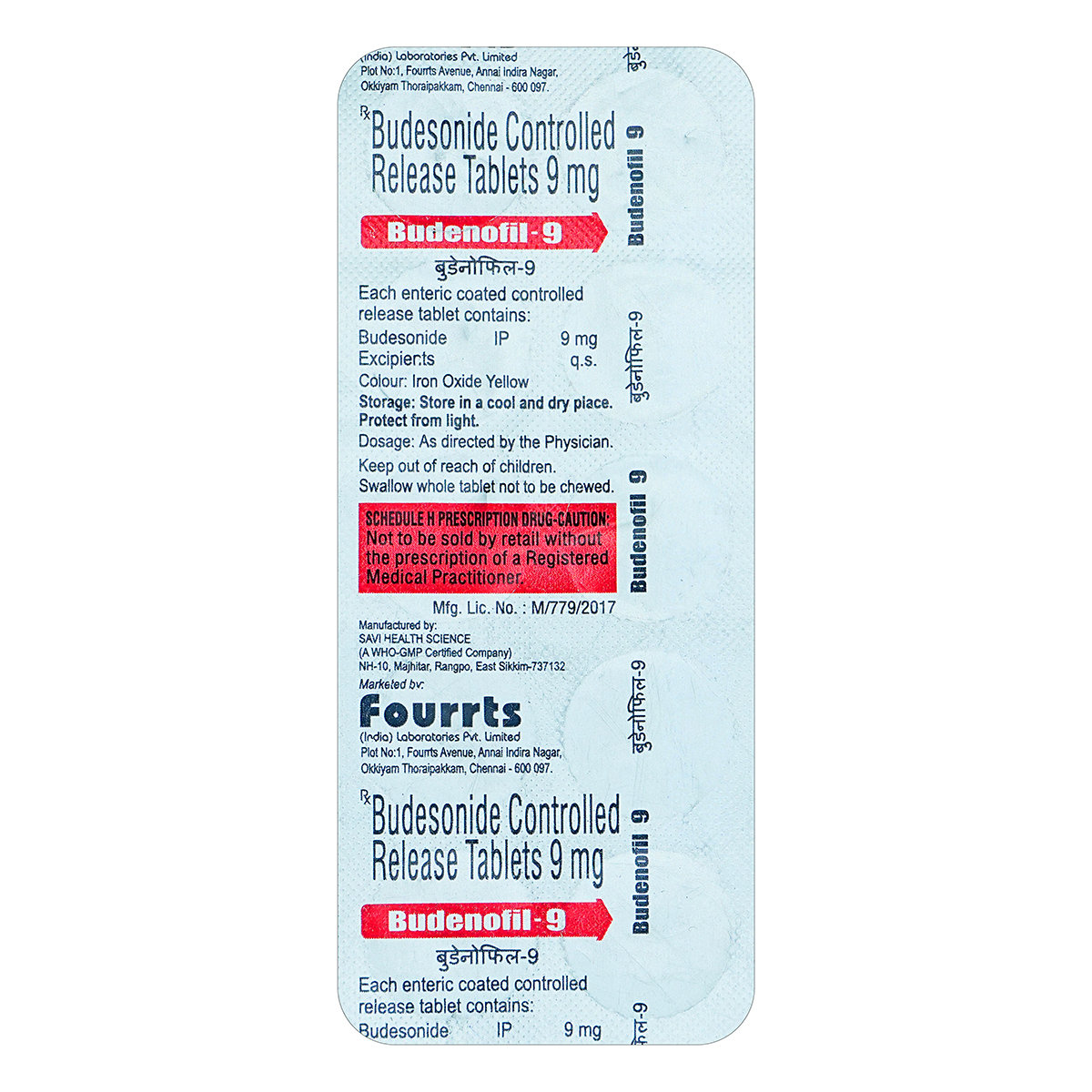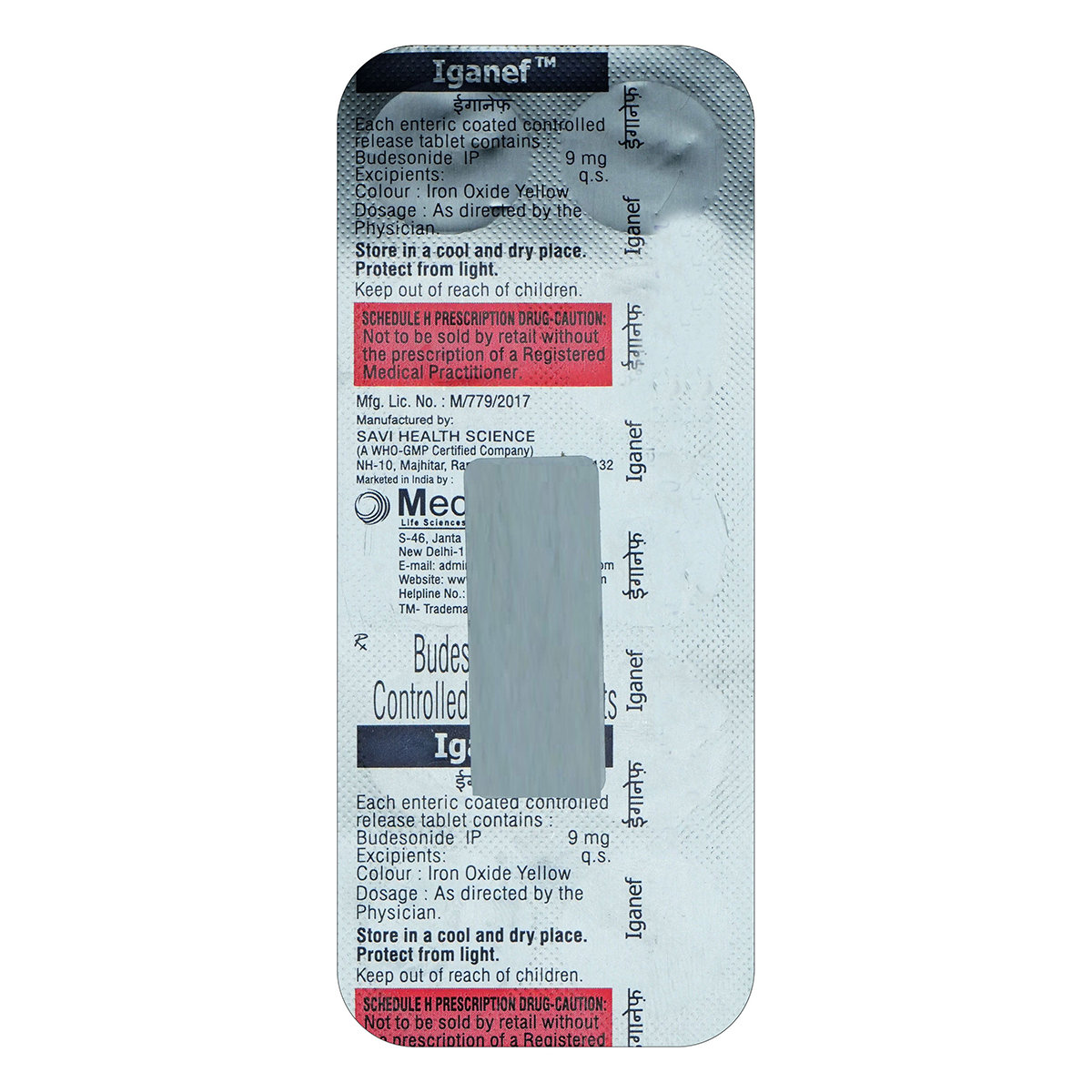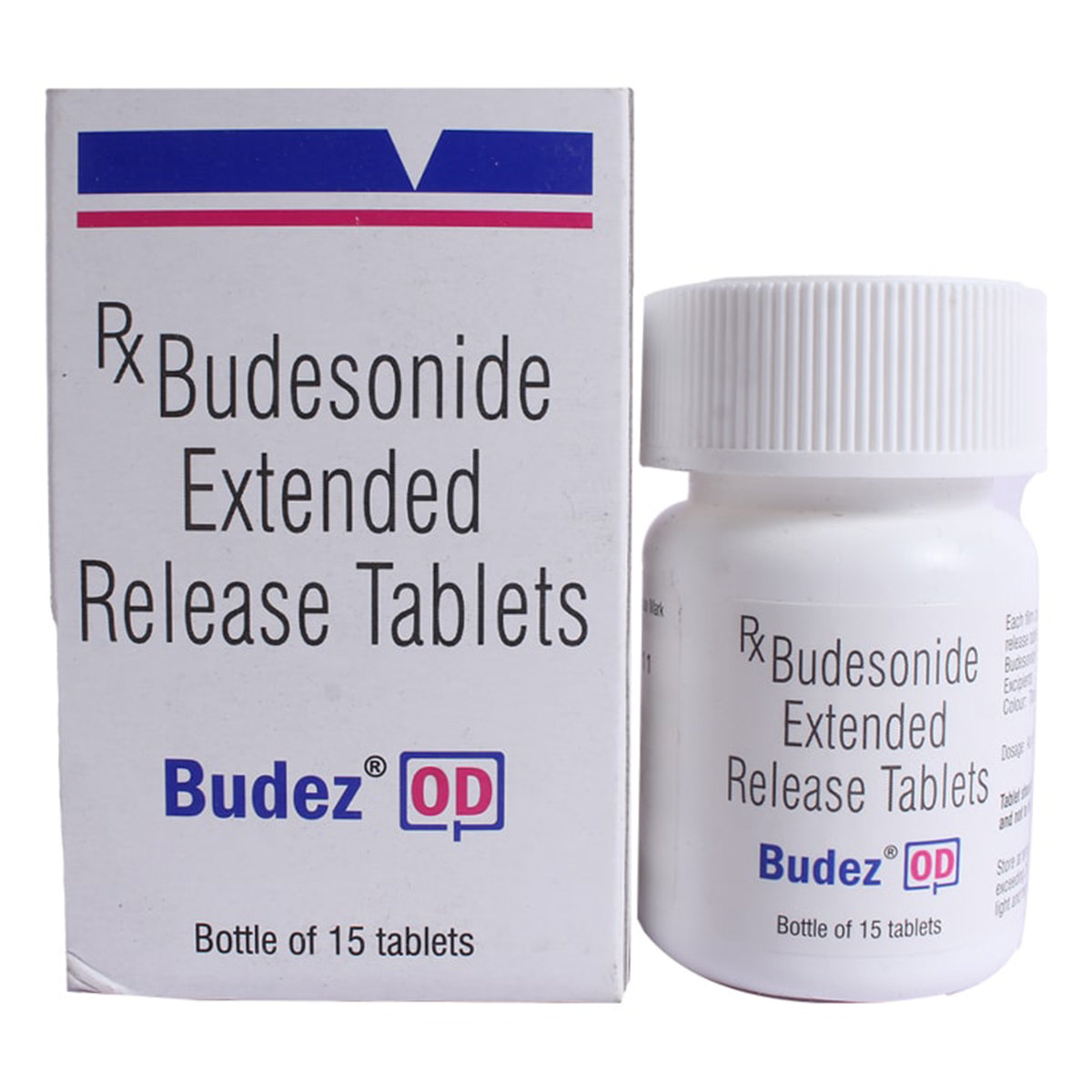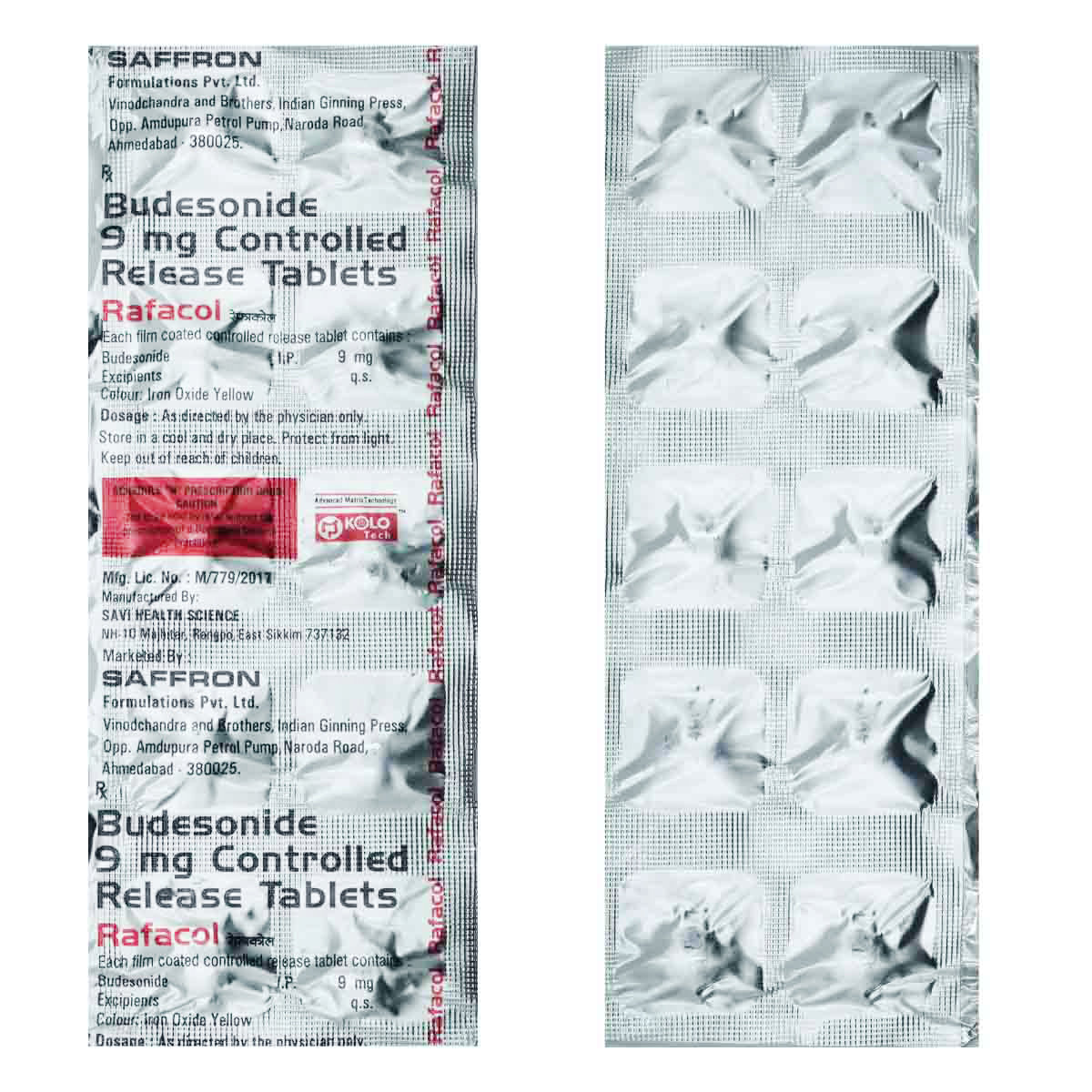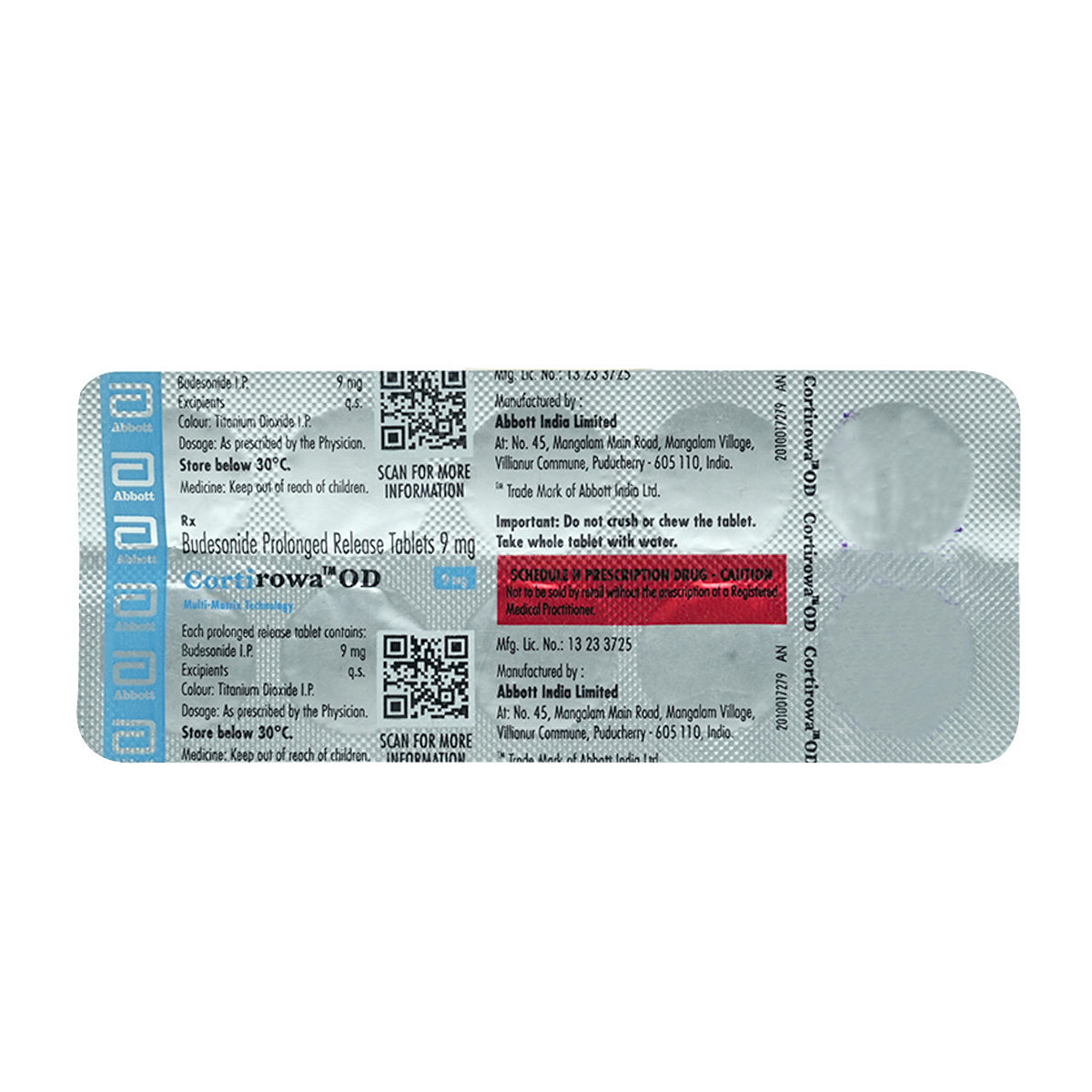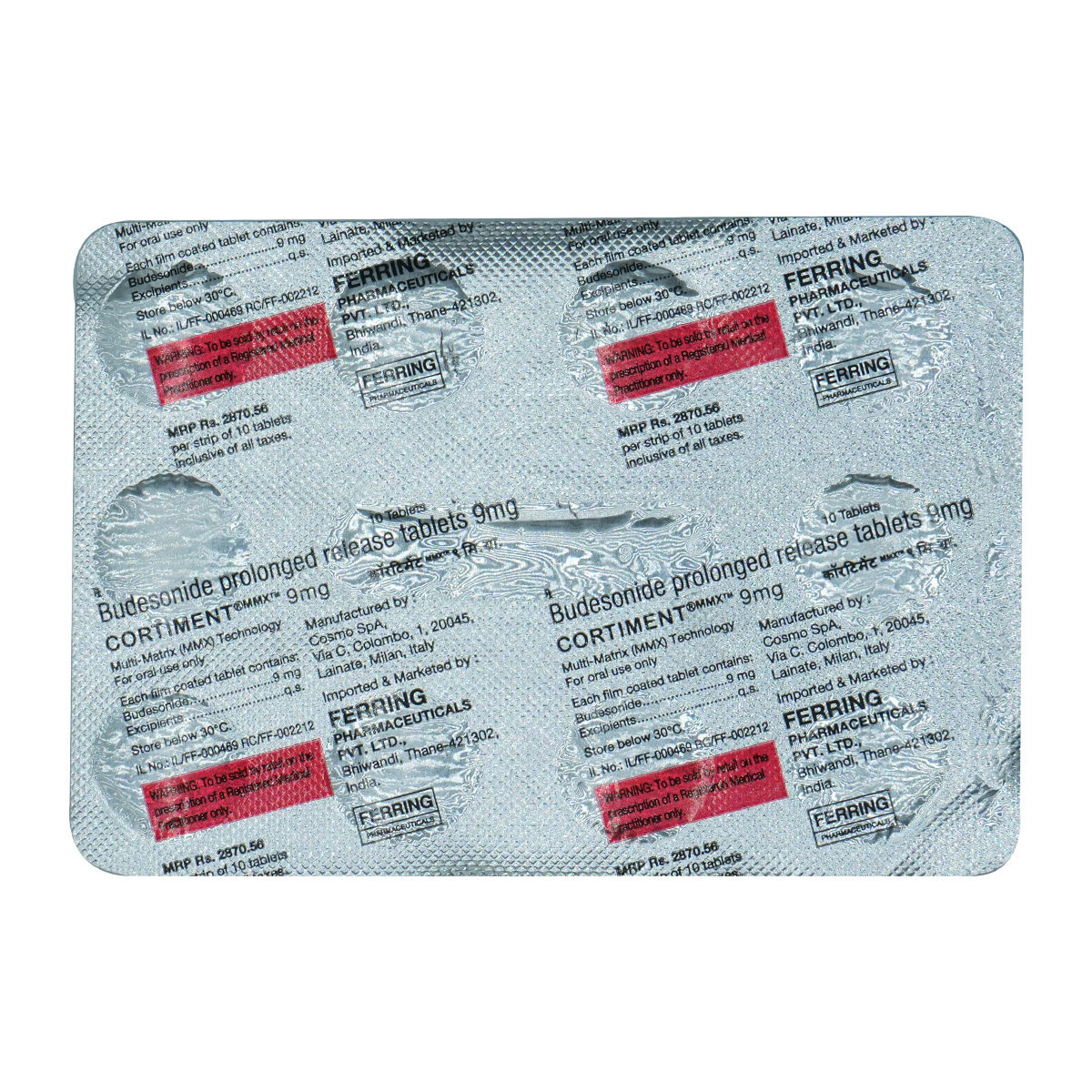Buditas-OD Tablet 15's
MRP ₹590.5
(Inclusive of all Taxes)
₹88.6 Cashback (15%)
Provide Delivery Location
Online payment accepted
 Prescription drug
Prescription drugWhats That
Composition :
Manufacturer/Marketer :
Consume Type :
Expires on or after :
Return Policy :
About Buditas-OD Tablet
Buditas-OD Tablet belongs to the class of medicines called 'glucocorticosteroids' used to treat inflammatory bowel diseases like Crohn's disease and ulcerative colitis. Crohn's disease is a chronic disease caused by the inflammation of the lining of the digestive tract. Ulcerative colitis is a condition that causes inflammation of the large intestine and rectum.
Buditas-OD Tablet contains 'Budesonide' that works by reducing the body's natural defence response. Thus, it reduces inflammation in the digestive tract. It may also decrease symptoms, such as pain and diarrhoea.
Your doctor will decide the duration of Buditas-OD Tablet based on your medical condition. The common side effects of Buditas-OD Tablet include headache, dizziness, nausea, vomiting, stomach pain, bloating, tiredness, stuffy nose, sneezing, sore throat, and back or joint pain. Most of these side effects of Buditas-OD Tablet do not require medical attention and gradually resolve over time. However, if the side effects are persistent, please consult your doctor.
Inform your doctor in advance if you have any allergic reactions to Buditas-OD Tablet or any other medications. Brief your medical history to the doctor if you have any heart, liver or kidney diseases, glaucoma, cataracts, tuberculosis, high blood pressure, osteoporosis, stomach ulcer, and a weak immune system. Check with your doctor before starting Buditas-OD Tablet if you are pregnant or breastfeeding. Buditas-OD Tablet may cause dizziness; hence avoid driving and alcohol intake while being treated with it. Buditas-OD Tablet should be used in children above eight years of age only when advised by a doctor.
Uses of Buditas-OD Tablet
Directions for Use
Key Benefits
Buditas-OD Tablet belongs to the class of medicines called 'glucocorticosteroids' used to treat inflammatory bowel diseases like Crohn's disease and ulcerative colitis. Buditas-OD Tablet works by reducing the body's natural defence response. Thus, it reduces inflammation in the digestive tract. It may also decrease symptoms, such as pain and diarrhoea. It reduces irritation and swelling in the intestines.
Storage
- Inform your doctor about the nausea and discuss possible alternatives to the medication or adjustments to the dosage.
- Divide your daily food intake into smaller, more frequent meals to reduce nausea.
- Opt for bland, easily digestible foods like crackers, toast, plain rice, bananas, and applesauce.
- Avoid certain foods that can trigger nausea, such as fatty, greasy, spicy, and smelly foods.
- Drink plenty of fluids, such as water, clear broth, or electrolyte-rich beverages like coconut water or sports drinks.
- Use ginger (tea, ale, or candies) to help relieve nausea.
- Get adequate rest and also avoid strenuous activities that can worsen nausea.
- Talk to your doctor about taking anti-nausea medication if your nausea is severe.
- Record when your nausea occurs, what triggers it, and what provides relief to help you identify patterns and manage your symptoms more effectively.
- Drink water or other clear fluids.
- To prevent worsening of pain, limit intake of tea, coffee, or alcohol.
- Include bland foods like rice, toast, crackers, and rice in your diet.
- Avoid lying down immediately after eating as it may cause indigestion or heartburn.
- Avoid acidic and spicy food as it may cause indigestion.
- Hydrate your body: Drink enough water to prevent dehydration and headaches.
- Calm Your Mind: Deep breathing and meditation can help you relax and relieve stress.
- Rest and Recharge: Sleep for 7-8 hours to reduce headache triggers.
- Take rest: lie down in a quiet, dark environment.
- Cold or warm compresses can help reduce tension.
- Stay Upright: Maintain good posture to keep symptoms from getting worse.
- To treat headaches naturally, try acupuncture or massage therapy.
- Over-the-counter pain relievers include acetaminophen and ibuprofen.
- Prescription Assistance: Speak with your doctor about more substantial drug alternatives.
- Severe Headaches: Seek emergency medical assistance for sudden, severe headaches.
- Frequent Headaches: If you get reoccurring headaches, consult your doctor.
- Headaches with Symptoms: Seek medical attention if your headaches include fever, disorientation, or weakness.
- Tell your doctor about your GAS symptoms. They may change your medication regimen or prescribe additional drugs to help you manage them.
- To manage GAS symptoms, eat a balanced diet of fibre, vegetables, and fruits.
- Drink enough water throughout the day to avoid constipation and treat GAS symptoms.
- Regular exercise like yoga and walking may help stimulate digestion and alleviate GAS symptoms.
- Take probiotics only if your doctor advises, as they may help alleviate GAS symptoms by promoting gut health.
- Take medication for GAS symptoms only if your doctor advises, as certain medications can interact with your existing prescriptions or worsen symptoms.
- If symptoms persist, worsen, or are accompanied by severe abdominal pain, vomiting, or bleeding, seek immediate medical attention.
- Inform your doctor about dizziness symptoms. They may adjust your medication regimen or prescribe additional medications to manage symptoms.
- Follow your doctor's instructions for taking medication, and take it at the same time every day to minimize dizziness.
- When standing up, do so slowly and carefully to avoid sudden dizziness.
- Avoid making sudden movements, such as turning or bending quickly, which can exacerbate dizziness.
- Drink plenty of water throughout the day to stay hydrated and help alleviate dizziness symptoms.
- If you're feeling dizzy, sit or lie down and rest until the dizziness passes.
- Track when dizziness occurs and any factors that may trigger it, and share this information with your doctor to help manage symptoms.
- Inform your doctor about the common cold symptoms you're experiencing due to medication.
- Your doctor may adjust your treatment plan, which could include changing your medication, adding new medications, or offering advice on managing your symptoms.
- Practice good hygiene, including frequent handwashing, avoiding close contact with others, and avoiding sharing utensils or personal items.
- Drink plenty of fluids, such as warm water or soup, to help thin out mucus.
- Get plenty of rest and engage in stress-reducing activities to help your body recover. If your symptoms don't subside or worsen, consult your doctor for further guidance.
Drug Warnings
Please inform your doctor if you use any prescription, or non-prescription medicines, including vitamin and herbal supplements, before using Buditas-OD Tablet . Let your doctor know if you have a recent history of heart, liver or kidney diseases, glaucoma, cataracts, tuberculosis, high blood pressure, osteoporosis, stomach ulcer, and a weak immune system before starting Buditas-OD Tablet . Pregnant and breastfeeding women should use Buditas-OD Tablet with proper consultation and caution. Buditas-OD Tablet may make you dizzy; hence drive or operate machinery only when you are alert. Avoid consuming alcohol along with Buditas-OD Tablet as it may worsen side effects. Buditas-OD Tablet is recommended in children above eight years of age only with a doctor's advice.
Drug-Drug Interactions
Drug-Drug Interactions
Login/Sign Up
Using mifepristone together with Buditas-OD Tablet may significantly reduce the effects of Buditas-OD Tablet.
How to manage the interaction:
Taking Buditas-OD Tablet with Mifepristone is not recommended as it can cause an interaction, but it can be taken if prescribed by the doctor. Do not stop using any medications without talking to a doctor.
Coadministration of Buditas-OD Tablet and Ribociclib may increase the absorption of the medication from Buditas-OD Tablet into the blood stream.
How to manage the interaction:
Taking Ribociclib with Buditas-OD Tablet can cause an interaction, consult a doctor before taking it. Consult a doctor if experience swelling, weight gain, high blood pressure, high blood glucose, muscle weakness, depression, acne, thinning skin, stretch marks, easy bruising, bone density loss, cataracts, menstrual irregularities, excessive growth of facial or body hair, and abnormal distribution of body fat, especially in the face, neck, back, and waist. Do not stop using any medications without talking to a doctor.
When Buditas-OD Tablet is used with teriflunomide, the risk of severe infections increases.
How to manage the interaction:
Co-administration of Buditas-OD Tablet along with teriflunomide can lead to an interaction, it can be taken if recommended by a doctor. However, if you develop a fever, chills, diarrhea, sore throat, muscular pains, shortness of breath, blood in sputum, weight loss, red or irritated skin, body sores, or discomfort or burning during urination, consult a doctor as soon as possible. Do not discontinue any medications without consulting a doctor.
Taking Buditas-OD Tablet with Vigabatrin, especially for a prolonged period of time, may raise the chance of significant adverse effects (loss of vision).
How to manage the interaction:
Co-administration of Buditas-OD Tablet along with Vigabatrin can lead to an interaction, it can be taken if recommended by a doctor. Regular eye check ups are advised. Do not discontinue any medications without consulting a doctor.
When Buditas-OD Tablet is taken with Cobicistat, may considerably enhance Buditas-OD Tablet absorption into the bloodstream which may lead to side effects.
How to manage the interaction:
Co-administration of Buditas-OD Tablet along with cobicistat can lead to an interaction, it can be taken if recommended by a doctor. However, if you experience swelling, weight gain, high blood pressure, high blood glucose, muscle weakness, depression, acne, thinning skin, stretch marks, easy bruising, bone density loss, vision problems, menstrual irregularities, excessive growth of facial or body hair, and abnormal distribution of body fat, especially in the face, neck, back, and waist, infections, a severe asthma attack, consult the doctor immediately. Do not stop using any medications without talking to a doctor.
Coadministration of itraconazole and Buditas-OD Tablet may significantly increase the blood levels of Buditas-OD Tablet.
How to manage the interaction:
Despite the possibility of an interaction, Buditas-OD Tablet and itraconazole can be used if a doctor prescribes them. Consult a doctor if have high blood pressure, high blood sugar, muscular weakness, depression, acne, stretch marks, easy bruising, loss of bone density, cataracts, swelling of legs or hands, irregular menstruation, or excessive development of hair on face or body development of hair. Never stop taking any medications without talking to a doctor.
Using baricitinib together with Buditas-OD Tablet may increase the risk of serious infections.
How to manage the interaction:
Taking Buditas-OD Tablet along with baricitinib can lead to an interaction, it can be taken if recommended by a doctor. If you experience fever, chills, diarrhea, sore throat, muscular pains, shortness of breath, blood in sputum, weight loss, red or irritated skin, body sores, and discomfort or burning while urinating, severe stomach pain, nausea, or vomiting, consult a doctor. Do not discontinue any medication without consulting a doctor.
When Buditas-OD Tablet is used with fingolimod, the risk of severe infections increases.
How to manage the interaction:
Co-administration of Buditas-OD Tablet along with fingolimod can lead to an interaction, it can be taken if recommended by a doctor. However, if you develop a fever, chills, diarrhea, sore throat, muscular pains, shortness of breath, blood in sputum, weight loss, red or irritated skin, body sores, or discomfort or burning during urination, consult the doctor as soon as possible. Do not discontinue any medications without consulting a doctor.
When Buditas-OD Tablet is taken with Idelalisib, may considerably enhance Buditas-OD Tablet absorption into the bloodstream which may lead to side effects.
How to manage the interaction:
Co-administration of Buditas-OD Tablet along with Idelalisib can lead to an interaction, it can be taken if recommended by a doctor. However, if you experience swelling, weight gain, high blood pressure, high blood glucose, muscle weakness, depression, acne, thinning skin, stretch marks, easy bruising, bone density loss, vision problems, menstrual irregularities, excessive growth of facial or body hair, and abnormal distribution of body fat, especially in the face, neck, back, and waist, infections, a severe asthma attack, consult the doctor immediately. Do not stop using any medications without talking to a doctor.
When Buditas-OD Tablet is taken with Nefazodone, may considerably enhance Buditas-OD Tablet absorption into the bloodstream which may lead to side effects.
How to manage the interaction:
Co-administration of Buditas-OD Tablet along with Nefazodone can lead to an interaction, it can be taken if recommended by a doctor. However, if you experience swelling, weight gain, high blood pressure, high blood glucose, muscle weakness, depression, acne, thinning skin, stretch marks, easy bruising, bone density loss, vision problems, menstrual irregularities, excessive growth of facial or body hair, and abnormal distribution of body fat, especially in the face, neck, back, and waist, infections, a severe asthma attack, consult the doctor immediately. Do not stop using any medications without talking to a doctor.
Drug-Food Interactions
Drug-Food Interactions
Login/Sign Up
Diet & Lifestyle Advise
- Manage stress and sleep for at least six to eight hours to rejuvenate your body.
- Maintain a fibre-rich diet and include healthy carbohydrates from fruits, vegetables and whole grains to maintain your blood glucose levels.
- Avoid smoking and alcohol consumption.
- Eat at regular intervals.
- Keep a check on your weight and exercise regularly to maintain a healthy weight.
Side Effects of Buditas-OD Tablet
- Headache
- Dizziness
- Nausea
- Vomiting
- Stomach pain
- Bloating
- Tiredness
- Stuffy nose
- Sneezing
- Sore throat
- Back or joint pain
Habit Forming
Therapeutic Class
All Substitutes & Brand Comparisons
RX
Budenofil-9 Tablet 10's
Fourrts India Laboratories Pvt Ltd
₹408.5
(₹36.77 per unit)
3% COSTLIERRX
Iganef 9 mg Tablet 10's
Mediart Life Sciences Pvt Ltd
₹421.5
(₹37.94 per unit)
7% COSTLIERRX
Igbuda Tablet 10's
P4 Medicine Pvt Ltd
₹430
(₹38.7 per unit)
9% COSTLIER
Author Details
We provide you with authentic, trustworthy and relevant information
Drug-Diseases Interactions
Drug-Diseases Interactions
Login/Sign Up
FAQs
Drug-Drug Interactions Checker List
- ALDESLEUKIN
- MIFEPRISTONE
- ASPIRIN
- CELECOXIB
- IBUPROFEN
- DABIGATRAN
- CLOPIDOGREL
- WARFARIN
Disease/Condition Glossary
Crohn's disease: It is a chronic disease caused by the inflammation of the lining of the digestive tract. This further leads to abdominal pain, severe diarrhoea, anaemia, loss of appetite, fatigue, weight loss, and malnutrition. Crohn's disease can be local (affecting the intestines) and systemic (that affects the whole body). The risk factors may include age, genetic reasons, smoking, few medications, diet, and infection. Treatment includes painkillers, anti-inflammatory drugs, and steroids.
Ulcerative colitis: It is a condition that causes inflammation of the large intestine and rectum. It causes irritation, inflammation, and ulcers in the lining of the colon and rectum. Symptoms include rectal bleeding, abdominal cramps, bloody diarrhoea, loss of appetite, stomach pain, fever, weight loss, and bloating. Ulcerative colitis occurs when the immune system mistakenly attacks its own body. Treatment includes painkillers, surgery, anti-inflammatory drugs, dietary supplements, and steroids.

Have a query?
Alcohol
Safe if prescribed
Avoid taking alcohol while using Buditas-OD Tablet since it may worsen the side effects.
Pregnancy
Consult your doctor
Please consult your doctor before using Buditas-OD Tablet if you are pregnant or planning to conceive. Your doctor will weigh the benefits and potential risks before prescribing Buditas-OD Tablet .
Breast Feeding
Consult your doctor
Buditas-OD Tablet may be excreted into the breast milk. Please consult your doctor before starting Buditas-OD Tablet if you are a nursing mother.
Driving
Safe if prescribed
Buditas-OD Tablet may make you feel dizzy. In such cases, do not drive or operate machinery until you feel better.
Liver
Consult your doctor
Buditas-OD Tablet should be used with caution in patients with liver diseases. Let your doctor know if you have any history of liver diseases or hepatic impairment.
Kidney
Consult your doctor
Buditas-OD Tablet should be used with caution in patients with kidney diseases. Let your doctor know if you have any history of kidney diseases.
Children
Safe if prescribed
Buditas-OD Tablet is recommended in children above eight years of age only with a doctor's advice.




